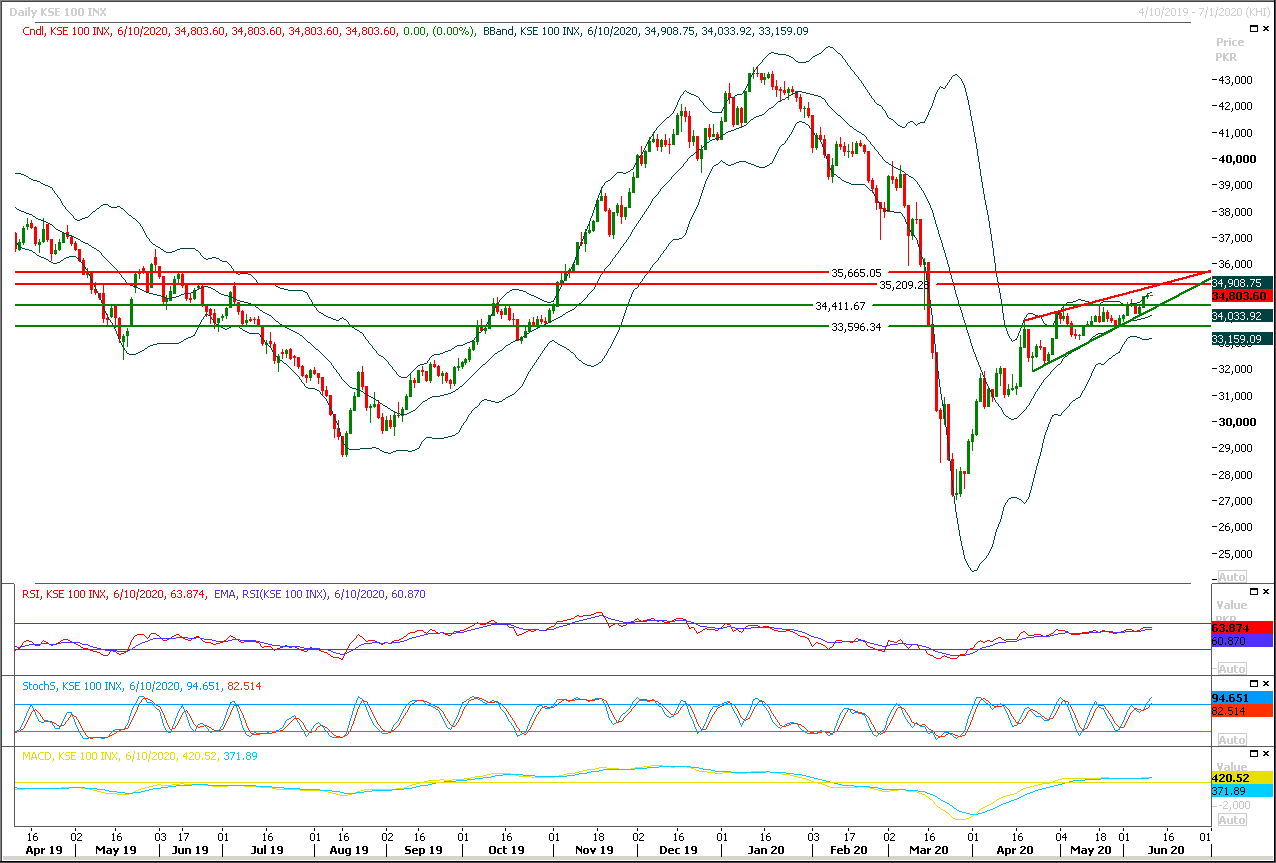Technical Overview
The Benchmark KSE100 index have continued its bullish journey inside its rising wedge and succeed in closing above its major resistant region of 34,500pts during last trading session, meanwhile daily momentum indicators have changed their direction towards bullish side and these would try to push index towards 34,960pts and 35,200pts during current trading session. It's recommended to stay cautious and post trailing stop loss on existing long positions because index would face its initial resistance from resistant trend line of its rising wedge which may push index for intraday. In case of bearish reversal index would try to find ground at 34,500pts and sliding below that region would push index towards 34,000-33,900pts region.

Regional Markets
Asian shares creep higher as markets wait for Fed
Asian stock markets eked out a 10th consecutive session of gains on Wednesday, but momentum ebbed as doubts about the global recovery from the pandemic returned ahead of the U.S. Federal Reserve meeting. The sideways moves in equities cap two weeks of stock market gains, turbocharged by Friday’s data showing a completely unexpected rise in U.S. employment last month. Safe havens from gold to the Japanese yen won support as optimism ebbed. MSCI’s broadest index of Asia-Pacific shares outside Japan rose 0.3% and Japan’s Nikkei rose 0.1%. The yen held on to two days of big gains and commodity currencies nursed Tuesday’s losses. Gold rose slightly. Focus has switched to the Fed’s economic outlook and whether a steepening of the U.S. yield curve during last week’s bond market selloff might prompt intervention at longer tenors.
Read More...
Business News
Fuel pricing on quarterly basis sought
In a rapidly evolving situation, the Petroleum Division on Tuesday moved another summary for immediate switching of fuel pricing to quarterly basis, with immediate effect from June 16 with the first price increase of about Rs9-10 per litre. The fresh move was launched on a day the federal cabinet took notice of fuel shortage across the country and the Ministry of Petroleum conceded for the first time in writing that 77 per cent petrol pumps in Khyber Pakhtunkhwa had completely dried out. Key members of the cabinet are reported to have criticised the Petroleum Division and the Oil & Gas Regulatory Authority for the ongoing crisis and demanded decisive action against those responsible.
Read More...
Expenditure freeze, revenue target of Rs4.95tr agreed with IMF
An agreement seems to have been reached to freeze the size and expenditures of the federal government in budget 2021, which is set to be announced on June 12. The decision has been made to keep the International Monetary Fund (IMF) programme on track. Informed sources told Dawn that the government’s economic team held a final round of discussions with the IMF late on Tuesday night to fine tune the broad contours of the upcoming budget. Austerity and belt tightening remain the focus of the upcoming budget for which every section and arm at the federal and provincial level would be required to contribute and sacrifice. Sources said the government would give a strong message to the world through the 2020-21 budget that it is “fiscally responsible despite severe challenges” and will prudently utilise whatever fiscal space becomes available through international flows.
Read More...
2,000 tariff lines may see duty cuts
The government decided to reduce customs duty on approximately 2,000 tariff lines in the FY2020-21 budget to reduce the cost of doing business, documents seen by Dawn showed on Tuesday. The Tariff Policy Board (TPB), led by Adviser to PM on Commerce Abdul Razak Dawood decided the changes in the duty structure on these tariffs lines after consulting with stakeholders. Last year, the government shifted tariff policy-setting powers from the Federal Board of Revenue (FBR) and to the TPB. The documents show that the TPB has decided to abolish two per cent additional customs duty on more than 1,600 tariff lines — raw materials and intermediate goods. All these tariff lines are non-agriculture and related only to industrial sector.
Read More...
PPE exports permitted
The government on Tuesday lifted the ban on exports of seven products classified as personal protective equipment (PPE) in a bid to allow manufacturers to honour international orders. The decision, taken by the National Command and Operation Centre of the National Coordination Committee on June 8, will allow exports of disposable gowns, disposable gloves, face shields, biohazard bags, goggles, shoe cover and hand sanitisers with immediate effect. However, the ban on exports of N-95 masks, surgical masks and Tyvek suits will remain in place, the SRO526 issued on Tuesday showed. The government had, on Mar 24 imposed a ban on export of all these PPEs in a bid to assess baseline requirements of the country.
Read More...


0 Comments
No comments yet. Be the first to comment!
Please log in to leave a comment.